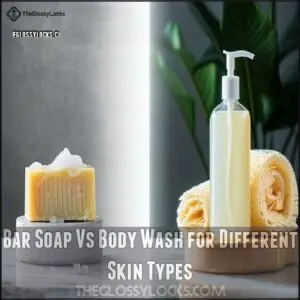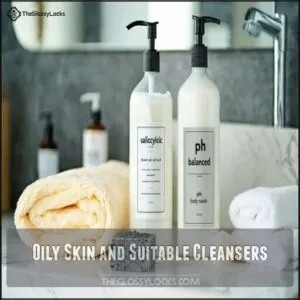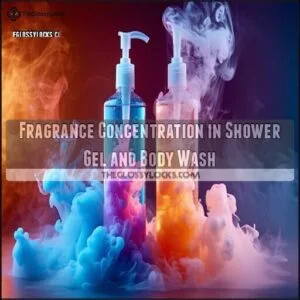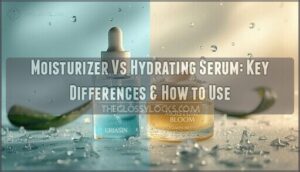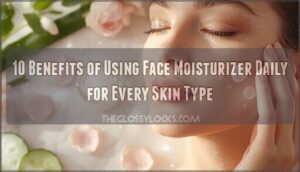This site is supported by our readers. We may earn a commission, at no cost to you, if you purchase through links.

Shower gels pack more concentrated fragrance and work best if you’re oily-skinned, while body washes deliver gentler cleansing with moisturizing ingredients for normal to dry skin.
Think of shower gel as the assertive sibling – great for deep cleaning and leaving lasting scents, while body wash is the nurturing one that keeps your skin hydrated.
Both cleanse effectively, but your skin type determines the winner. There’s more to this sudsy debate, including specific ingredients that make all the difference, and understanding these can help you make an informed decision about what’s best for your skin, considering the skin type.
Table Of Contents
- Key Takeaways
- Shower Gel Vs Body Wash Basics
- Choosing The Right Cleanser for Your Skin Type
- Ingredients to Avoid in Shower Gel and Body Wash
- Ingredients to Seek in Shower Gel and Body Wash
- Shower Gel Vs Body Wash: Texture, Fragrance, and Uses
- Tips for Using Shower Gel and Body Wash Effectively
- Frequently Asked Questions (FAQs)
- Which is better shower gel or body wash?
- Can I use shower gel as a body wash?
- What is the purpose of shower gel?
- Is it better to shower with soap or gel?
- Can shower gel be used as body wash?
- Can I use shower gel every day?
- What are the disadvantages of shower gel?
- What’s the difference between a body wash and a shower gel?
- Is it safe to shower with a rash?
- How do you use a body wash & shower gel?
- Conclusion
Key Takeaways
- Shower gel has a thicker texture with stronger fragrances and works best for oily skin, while body wash has a creamier consistency with more moisturizing ingredients designed for normal to dry skin.
- You’ll get a richer lather from shower gel but might experience more dryness afterward, whereas body wash offers gentler cleansing that maintains your skin’s natural moisture barrier.
- For the best results, match your cleanser to your skin type—choose shower gel for oily skin and deeper cleaning, or body wash for dry, sensitive skin that needs hydration.
- You can maximize your shower routine by applying products gently (avoid harsh scrubbing), using a washcloth to distribute product evenly, and applying moisturizer within 3 minutes after showering while your skin is still damp to achieve better results.
Shower Gel Vs Body Wash Basics
You’ve probably seen shower gel and body wash used interchangeably, but they’re not exactly the same.
While both cleanse your skin, their texture, consistency, and how they work with different skin types can make a big difference, particularly in terms of skin types.
What is Shower Gel
Imagine this: You’re in the shower, ready to recharge, and that’s where shower gel shines.
This water-based cleansing gel has a thick, gel texture that creates an impressive lather, leaving your skin squeaky clean.
Packed with surfactants and fragrance compounds, it offers scent longevity, making it ideal for busy mornings.
Its versatility even extends to hair use for convenience.
| Feature | Benefit | Suitable For |
|---|---|---|
| Thick Gel Texture | Deep cleansing | Oily skin |
| Rich Lather | Efficient cleaning | Active lifestyles |
| Scent Longevity | Lasting fragrance | Morning routines |
| Adjustable Formula | Use even in humid climates | All skin types |
| Multi-function Use | Skin and hair compatibility | Travel-friendly |
The features of this gel make it a great option for various skin types and lifestyles, including oily skin and active lifestyles.
What is Body Wash
Body wash stands out with its creamy texture and skin-loving formulation.
It’s packed with moisturizing ingredients like shea butter and natural oils, gently cleansing without robbing your skin of hydration.
Perfect for sensitive or dry skin, it doubles as a cleanser and a mini spa session—luxury in a bottle!
Type Primary Ingredients Best For
Say goodbye to tight, dry skin—body wash leaves you smooth, soft, and refreshed!
Many users prefer body washes with EWG Verified ratings to minimize exposure to harmful chemicals.
Key Differences Between Shower Gel and Body Wash
Understanding the differences between shower gel and body wash helps you pick the right one for your skin.
While both are liquid body cleansers, their formulations, textures, and benefits vary.
Here’s a quick breakdown:
| Feature | Shower Gel | Body Wash |
|---|---|---|
| Consistency | Thick, gel-like | Creamy, lotion-like |
| Lather Quantity | Rich and bubbly | Softer, creamier |
| Formulation Differences | More concentrated, fewer moisturizers | Diluted with hydrating ingredients |
| Best For | Oily, combination skin |
Dry, sensitive skin.
Shower gel feels lightweight and packs a punch against oil, sweat, and grime, carrying a scent that lingers longer post-shower.
Body wash, on the other hand, brings that spa-like hydration to your skin, nourishing it deeply with every use.
Whether you’re after squeaky-clean skin or buttery softness, there’s a body cleanser for you!
Choosing The Right Cleanser for Your Skin Type
Finding the right cleanser for your skin type isn’t as complicated as it sounds, but it’s important to know what works best for you.
Whether your skin’s dry, oily, or sensitive, choosing between shower gel and body wash can make a big difference in how your skin feels after a shower.
Bar Soap Vs Body Wash for Different Skin Types
Your skin’s unique needs should always guide your choice between bar soap and body wash.
While both cleanse effectively, they interact with your skin differently, depending on its type and preferences.
Here’s how it breaks down:
- Oily skin loves a good bar soap.
- Dry and normal skin crave body wash hydration, which preserves your natural lipids and nourishes the skin barrier.
- Sensitive skin? Reach for a gentle body wash designed to soothe and minimize skin irritation, unlike bar cleansers, which can include harsh ingredients.
Bar soap’s minimal packaging appeals to eco-conscious users but can leave skin feeling stripped, especially in colder climates.
Ultimately, listen to your skin—because it knows best.
Body Wash Vs Shower Gel for Different Skin Types
Your skin type is the key to choosing between body wash and shower gel.
If you’ve got dry skin, body wash acts like a hydrating hug, locking in moisture where you need it most.
Oily skin benefits from shower gel’s deep-cleaning power, keeping excess shine in check.
Sensitive skin? Opt for soothing, fragrance-free body washes to avoid irritation.
Combination skin can play the mix-and-match game: use gel on oily areas and a creamy wash for drier parts.
Climate counts too—humid weather loves gel, while dry climates embrace body wash.
Skin Type and Personal Preference in Choosing a Cleanser
Choosing a cleanser is personal—it’s more about what feels right for your skin than what the label promises.
Sure, both shower gels and body washes suit different skin types, but finding your fit means paying attention to more than just ingredients.
Your skin type is your guide, but personal preferences seal the deal.
Think about:
- Skin sensitivity – Does your skin crave hydration or need oil control?
- Scent preferences – Do you love subtle aromas or bold, invigorating fragrances?
- Lather and texture – Do you want rich bubbles or a softer, creamier feel?
- Climate impact – Does dry air demand extra hydration, or do humid days require a deeper clean?
Listen to your skin.
Feeling tight post-shower? You might need more moisture in your routine.
If there’s an oily residue, it could be time to tweak your cleansing habits.
Normal to Dry Skin and Suitable Cleansers
For normal to dry skin, hydration is your best friend, and a moisturizing body wash is the ally you’ve been seeking.
While shower gel can be a bit harsh, a gentle formula packed with emollient benefits—like ceramides, glycerin, or hyaluronic acid—cleanses without upsetting your lipid barrier.
Want the inside scoop? Here’s a quick cheat sheet:
| Do | Don’t |
|---|---|
| Use creamy, moisturizing body wash. | Avoid harsh surfactants or alcohol. |
| Check for “hydration” on labels. | Skip exfoliating microbeads. |
| Lock in moisture post-shower. | Over-scrub your skin. |
| Pick fragrance-free if sensitive. | Settle for tight, dry skin after. |
Consider browsing options for gentle skin cleansers to find the perfect match.
A comfortable, nourished feeling post-shower? That’s non-negotiable!
Oily Skin and Suitable Cleansers
Got oily skin that feels like it’s in the humidity Olympics? Don’t worry—you can manage it without stripping your face dry. The key is finding cleansers that balance oil while keeping your skin happy.
- Shower gels with oil control ingredients like salicylic acid work wonders for unclogging pores and preventing breakouts. They’re great for your daily routine.
- Lightweight body washes labeled as “pH balanced” help avoid that tight, uncomfortable feeling post-shower.
Look for gentle exfoliation to tackle dead skin cells and cleanse thoroughly without irritation. Want to go extra? Try charcoal or clay-based soaps for pore-minimizing benefits. Even oily skin deserves hydration, so opt for formulas that clean and moisturize. Finding the right oily skin bodywash can make a significant difference.
Sensitive Skin and Suitable Cleansers
Sensitive skin can make shopping for cleansers tricky, but it doesn’t have to be. A mild, soothing body wash is usually a better choice than shower gel for sensitive skin, as it’s more moisturizing and less likely to irritate.
Look for products that combine comfort and cleansing without leaving your skin feeling tight.
Here’s what to keep in mind:
- Fragrance-free formulas: Avoid scents that might trigger irritation.
- Hypoallergenic options: Designed with minimal irritants for gentle care.
- Soothing ingredients: Look for aloe vera, glycerin, or oat extract to calm your skin.
Dermatologists recommend mild surfactants and moisturizers like ceramides. Consider exploring options for body wash for sensitive skin for a gentler cleansing experience.
Treat your skin kindly—choose products designed for your skin type and enjoy healthier, happier skin with effective care.
Ingredients to Avoid in Shower Gel and Body Wash
It’s easy to overlook what’s actually in your shower gel or body wash, but some ingredients can do more harm than good.
By avoiding harsh chemicals like parabens, phthalates, and microbeads, you’ll keep your skin healthier and happier.
Parabens and Phthalates in Cleansers
Don’t let sneaky ingredients take the shine out of your shower gel or body wash routine.
Parabens, famous for preserving products, can mimic estrogen, leading to endocrine disruption. Phthalates, often hiding under "fragrance," pose reproductive risks and may even irritate your skin.
Here’s a handy comparison:
| Ingredient | Purpose | Health Concern | Common Labeling | Safer Alternative |
|---|---|---|---|---|
| Parabens | Preservative | Endocrine disruption | "Paraben" | Grapefruit seed extract |
| Phthalates | Plasticizer/Fragrance | Reproductive health issues | "Fragrance" or "DEHP" | Phthalate-free labeling |
| Sulfates | Foam enhancer | Skin irritation | "Sodium lauryl sulfate (SLS)" | Coconut-based surfactants |
Your skin absorbs what you apply. Stick to safe cleansers, and embrace products labeled “paraben-free” and “phthalate-free.” Your health—and your skin—will thank you!
Heavy Fragrances and Dyes in Cleansers
That delightful lavender scent or vibrant blue hue in your shower gel might seem luxurious, but it can come with a price—your skin’s health.
Fragrance allergens and artificial colors, often hidden under vague ingredient labels like "fragrance" or "dyes," are common culprits for skin irritation.
If you notice itching, redness, or even stinging after showering, your cleanser may be the sneaky irritant. Up to 20% of people experience fragrance sensitivity, and the culprit isn’t always obvious.
Those enticing tropical or floral scents? They could contain dozens of unlisted irritants. Dye sensitivities are no better, causing reactions ranging from subtle dryness to full-blown allergies.
Want irritant reduction? Opt for fragrance-free body wash or natural alternatives with essential oils. Your sensitive skin will love simple, thoughtful formulations without the flashy extras.
Some fragrances even contain phthalates, which are known to cause hormone disruption issues.
Microbeads in Exfoliating Washes
Beyond heavy fragrances and dyes, exfoliating washes often hide a sneaky foe: microbeads. These tiny plastic particles might seem helpful, but their environmental impact is anything but small.
- Microbead Pollution: Once rinsed off, they bypass water treatment systems and invade oceans, harming marine ecosystems. Think of them as glitter—impossible to clean up!
- Skin Exfoliation Gone Wrong: Microbeads can cause micro-tears, leaving your skin irritated and inflamed.
- Regulation Efforts: The U.S. banned microbeads in cosmetics, but not all countries have followed.
Luckily, biodegradable exfoliants like sugar, salt, or oatmeal work just as well without trashing the planet. Swap plastic for nature—your skin and Earth will thank you!
Harsh Chemicals in Cleansers
Harsh chemicals in your shower gel or body wash can feel like a betrayal to your skin’s natural defenses, often stripping away its precious moisture.
It’s not just about squeaky-clean—your cleanser’s ingredients matter.
Here’s a quick snapshot of common culprits and safer swaps:
| Chemical | Problem | Safer Alternative |
|---|---|---|
| Sulfates (SLS) | Dryness, irritation | Coconut-based surfactants |
| Parabens | Hormone disruption | Natural preservatives |
| Phthalates | Fragrance sensitivities | Phthalate-free scents |
| Alcohol | Dehydration | Aloe Vera |
| Synthetic dyes | Dye irritation | Plant-based colorants |
When choosing body wash or shower gel, avoid these harmful additives. Opt for body wash ingredients designed with hydration in mind or shower gel ingredients that prioritize natural, soothing alternatives—it’s your skin’s happy place!
Opting for safer swaps and being mindful of the ingredients can make a significant difference in maintaining your skin’s health.
Ingredients to Seek in Shower Gel and Body Wash
When choosing a shower gel or body wash, you’ll want ingredients that benefit your skin instead of stripping it.
Look for options with moisturizers like ceramides or hyaluronic acid, and gentle natural ingredients to keep your skin happy and healthy.
Gentle and Moisturizing Body Washes
In the context of skin hydration, a moisturizing body wash is your secret weapon.
Not all body washes are created equal, so picking one with nourishing ingredients can make a big difference, especially for sensitive skin.
These creamy formulas don’t just clean—they pamper, replenish, and protect your natural oils.
Here’s what to look for in a hydrating body wash:
- Coconut oil: Locks in moisture while creating that luxurious creamy lather.
- Aloe vera: Soothes sensitive skin and offers gentle cleansing, leaving you refreshed.
- Argan oil: Provides deep hydration, making your skin feel soft and silky.
- Glycerin: Helps your skin stay moisturized throughout the day, no matter the weather.
- Sunflower seed oil: Rich in Vitamin E, it nourishes and cares for delicate skin.
Choosing the right body wash benefits your skin long after you step out of the shower.
Ceramides, Hyaluronic Acid, and Petrolatum in Cleansers
While a moisturizing body wash has its perks, the right ingredients can make your skin care routine feel like magic.
Enter ceramides, hyaluronic acid, and petrolatum—your skin’s hydration superheroes.
| Ingredient | Key Benefits | Best For |
|---|---|---|
| Ceramides | Strengthen the skin barrier, lock moisture | Eczema-prone skin |
| Hyaluronic Acid | Attract and retain water (up to 1,000x!) | Dehydrated skin |
| Petrolatum | Forms a protective seal, prevents dryness | Extremely dry skin |
These three are the dream team for barrier repair and hydration.
Look for fragrance-free formulas if your skin’s on the sensitive side.
Whether it’s a creamy body wash or an invigorating shower gel, their cleanser formulation guarantees you’re treating your skin, not just cleaning it.
Natural Ingredients in Shower Gel and Body Wash
Natural body washes and shower gels shine when filled with plant-based cleansers that nourish and protect your skin.
Your skincare routine gets a boost with eco-friendly formulas that feel as good as they’re effective.
Here’s what to look for:
- Coconut oil: Hydrates dry areas without clogging pores.
- Aloe vera: Soothes irritation while balancing your natural oils.
- Green tea extracts: Tackle oily skin while offering antioxidant benefits.
Opt for products with organic certifications and sustainable sourcing for gentle care that respects both your skin and the planet.
Many brands are also EWG Verified products for added assurance.
Shower Gel Vs Body Wash: Texture, Fragrance, and Uses
In the case of shower gel and body wash, their texture and fragrance are designed to suit different skin types and preferences.
Understanding these differences helps you pick the right option, whether you need a thicker gel for oily skin or a creamier wash for added hydration.
Texture and Consistency of Shower Gel and Body Wash
The texture of shower gel and body wash affects how they feel on your skin—and their overall vibe.
Shower gel boasts a gellike consistency with firm gel firmness, creating a thick, concentrated lather. Body wash, on the other hand, flows with a creamy, liquid soap consistency and spreads smoothly.
Here’s a quick comparison:
| Feature | Shower Gel | Body Wash |
|---|---|---|
| Viscosity | Thick and firm | Thin and flowing |
| Feel | Slick, invigorating | Creamy, rich |
| Lather | Dense, focused | Velvety, widespread |
Pick what suits your wash viscosity and skin sensation preferences—go gel for clean invigoration or body wash for luxurious moisture!
Fragrance Concentration in Shower Gel and Body Wash
Fragrance plays a big role in choosing between shower gel and body wash.
Shower gels pack a punch with higher fragrance intensity, offering a bold aroma layering experience.
Body washes, on the other hand, lean toward subtler scents, ideal for delicate skin or those avoiding overpowering fragrances.
If you’re battling skin sensitivity, body washes are generally gentler.
The key differences between these products can be summarized by their fragrance intensity, scent longevity, and impact on skin sensitivity.
Understanding these factors can help you make an informed decision about which product to use, considering your personal preferences and skin type.
Uses and Ideal Skin Types for Shower Gel and Body Wash
After picking a scent you love, think about how your skin feels after a shower.
| Skin Type | Shower Gel Performance | Body Wash Performance |
|---|---|---|
| Oily Skin | Controls shine | Balances hydration |
| Dry Skin | May over-cleanse | Deeply moisturizes |
| Sensitive Skin | Choose carefully | Calms irritation |
| Combination | Great for oily zones | Hydrates drier areas |
| Mature Skin | Too harsh? | Boosts elasticity |
For ideal results, consider ingredients for dry skin like ceramides and hyaluronic acid. Match your needs, skin type, and climate for glowing results!
Tips for Using Shower Gel and Body Wash Effectively
You’ll get the most out of your shower products when you use them correctly, from applying body wash with a gentle washcloth to using shower gel sparingly if you have dry skin.
For ideal skin health, avoid aggressive scrubbing that strips away natural oils, and always follow with moisturizer while your skin is still slightly damp to lock in hydration.
Applying Body Wash With a Washcloth
While texture and feel can help distinguish shower products, how you apply them matters just as much.
Using a washcloth with your body wash offers impressive benefits:
- Creates gentle exfoliation without harsh scrubbing
- Improves product absorption into skin
- Requires less product for the same cleansing power
- Targets rough patches on elbows and knees effectively
- Distributes product evenly across your body
Remember to hang your washcloth to dry completely between uses to prevent bacteria growth and maintain good hygiene, which is crucial for gentle exfoliation and overall skin health, ensuring a clean and healthy skin through proper care.
Avoiding Scrubbing to Prevent Moisture Loss
Vigorous scrubbing sessions can wreak havoc on your skin’s natural moisture barrier, leaving it parched and irritated after showering. Oil-based cleansers from your shower gel or body wash need gentle application to maintain skin moisture.
For effective gentle cleansing that preserves hydration:
- Use soft cloths with light, circular motions rather than harsh loofahs
- Pat dry instead of rubbing—treat your skin like expensive silk, not a dirty floor
- Choose hydrating body wash formulas for extra skin barrier protection
Remember, you’re not trying to scrub away your skin’s personality! Gentle techniques help retain essential oils while still getting perfectly clean. This approach ensures that your skin remains healthy and moisturized.
Applying Moisturizer After Showering
The golden window for moisturizer application opens the moment you step out of the shower.
Here’s a short, engaging blockquote based on that paragraph:
Catch that golden post-shower moment—your skin’s thirstiest time is its most receptive to moisture.
Pat your skin until it’s damp—not dripping—then apply moisturizer within 3 minutes when your skin’s moisture barrier is most receptive.
Products containing glycerin maximize hydration benefits through effective product layering.
This timing trick works perfectly regardless of whether you’ve used shower gel or body wash, substantially improving moisturizer absorption, and your skin care routine will yield noticeably softer, healthier skin with this simple post-shower hydration strategy.
Using Shower Gel in Moderation for Dry Skin
While moisturizing is essential, shower gel application requires special attention for dry skin types. Using shower gel in moderation can make a significant difference in your skin’s hydration levels.
If you struggle with dry skin, consider:
- Limiting shower gel use to 2-3 times weekly to prevent excessive moisture loss
- Choosing formulations with hydrating ingredients like glycerin, aloe, or ceramides
- Applying with a soft touch instead of vigorous scrubbing that damages your skin barrier
Patch testing new products can save your skin from potential irritation. During colder months, switching completely to body wash offers immediate hydration benefits, keeping your skin comfortable and nourished.
Frequently Asked Questions (FAQs)
Which is better shower gel or body wash?
Neither product is universally better – body wash offers more moisture for dry skin while shower gel works well for oily skin.
Your choice depends on your specific skin type and personal preferences.
Can I use shower gel as a body wash?
Yes, you can use shower gel as a body wash.
They’re both liquid cleansers with similar ingredients for washing your body.
Just apply shower gel directly to your skin or with a washcloth, lather, and rinse, using similar ingredients for a cleansing effect.
What is the purpose of shower gel?
Tired of feeling like a greased-up turkey after showering?
Shower gel’s purpose is to cleanse your skin using surfactants while having a thicker consistency that controls oiliness—perfect if you’re prone to acne or sporting that post-workout shine.
This makes it ideal for specific skin types, particularly those who need to manage oiliness.
Is it better to shower with soap or gel?
Both work equally well, but your skin type determines the winner.
If you’re dealing with oily or acne-prone skin, gel’s your best friend for cutting through excess oil.
Dry skin? Grab a moisturizing soap or body wash instead.
Can shower gel be used as body wash?
You can absolutely use shower gel as body wash, and you’ll get similar cleansing results.
The two products share many ingredients, though shower gel tends to be thicker and more fragrant than typical body washes.
Can I use shower gel every day?
Most people can safely use shower gel daily.
Your skin type matters though – if you’ve got dry skin, look for moisturizing formulas.
Those with sensitive skin might benefit from alternating with gentler cleansers.
What are the disadvantages of shower gel?
Shower gel can dry out your skin due to harsh surfactants, costs more than bar soap, and creates plastic waste.
It’s also heavier to transport and often contains potentially irritating fragrances and chemicals.
What’s the difference between a body wash and a shower gel?
Body wash is creamier with moisturizing ingredients for dry skin.
While shower gel has a thicker, gel-like consistency better for oily skin.
You’ll notice gels produce more lather and often retain fragrance longer.
Is it safe to shower with a rash?
It’s safe to shower with a mild rash, but stick to lukewarm water and skip harsh soaps or scrubs.
Use gentle cleansers and pat your skin dry—don’t rub.
If it worsens, see a doctor.
How do you use a body wash & shower gel?
Ever danced with cleanliness?
Apply body wash or shower gel to a wet washcloth or loofah, gently scrub your skin in circular motions, then rinse thoroughly.
Don’t forget hard-to-reach areas like your back.
Conclusion
Ultimately, the shower gel vs body wash debate comes down to understanding your skin’s unique needs.
Like choosing between rain and sunshine for a garden, each nourishes differently.
For oily skin, shower gel’s stronger cleansing power shines, while dry skin flourishes with body wash’s moisturizing embrace.
Listen to what your skin tells you, adjust with the seasons, and remember: the best cleanser is one that leaves you feeling refreshed and your skin balanced.
Your perfect match awaits!
- https://epicuren.com/blogs/news/shower-gel-vs-body-wash-what-s-the-difference-and-why-does-it-matter
- https://botaniesoap.com/blogs/product-faq/body-wash-vs-shower-gel?srsltid=AfmBOopmwWf-p_z9OivVzR2HHyRJuAPbhfP0ZNrCrXpno7qcjmaMpHZD
- https://www.clarinsusa.com/en/beauty-faq/best-shower-gel-uses-benefits-vs-body-wash/?srsltid=AfmBOoqhW4YcVnwY8PNb1gUrqQZ4oH199EWG7E1vIXZb26NMk8akbyad
- https://www.kiehls.in/shower-gel-vs-body-wash-what-is-the-difference?srsltid=AfmBOoquPefbVxN4uck4GyXGOTWN1S_DeOUJl9VFm3DndNF8GwcD3s6F
- https://www.dove-india.com/blogs/all_blogs/shower-gel-vs-body-wash?srsltid=AfmBOoooaeTvIw9t_ljtlvt7q3hO738EN1FVVsb3xnTtHlbJVQvAHFZB


